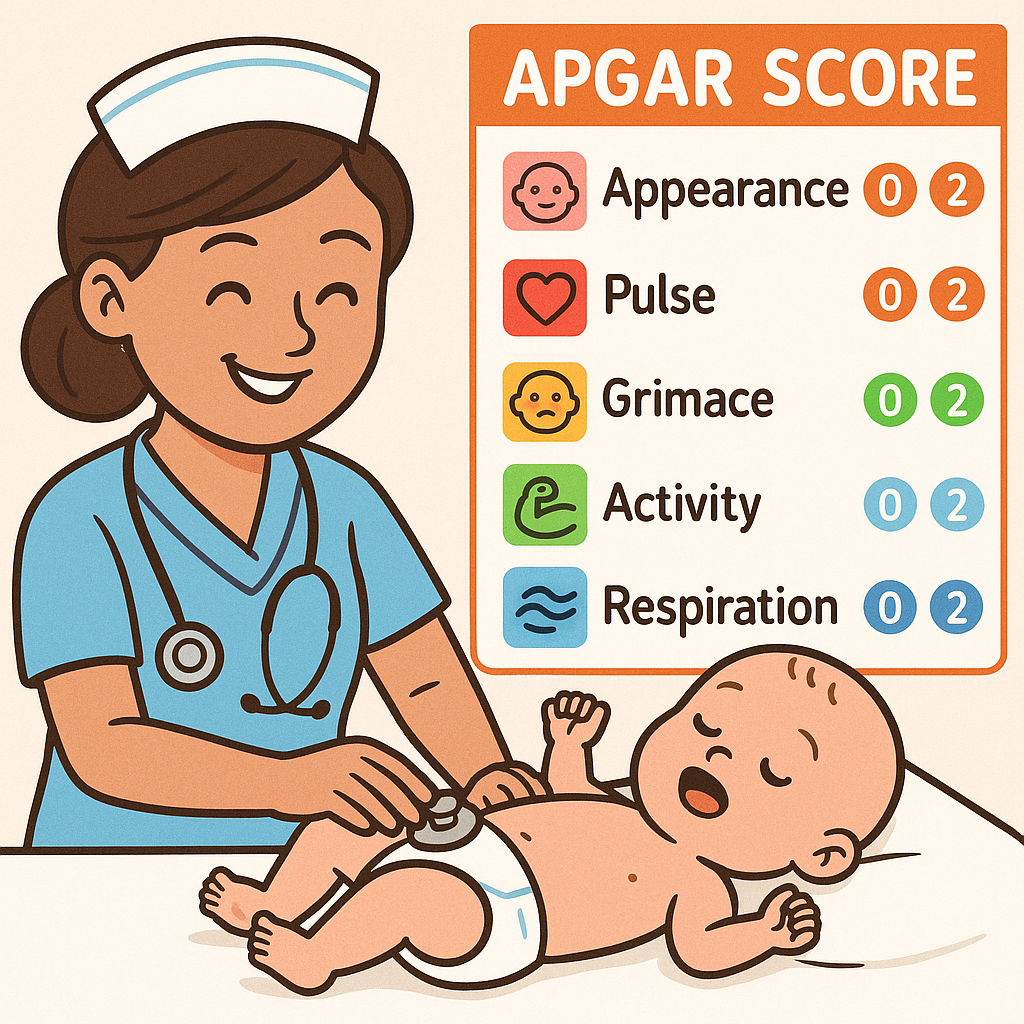For every registered nurse (RN nurse), understanding the APGAR score is a must — not just for the NCLEX, but also for safe newborn care in practice. The APGAR scoring system is a quick and effective tool to evaluate a newborn’s adaptation to life outside the womb, helping nurses identify babies who may need immediate intervention. Let’s break it down simply so you can add this essential concept to your nursing bundle of skills.
🩺 What Is the APGAR Score?
The APGAR score is a rapid assessment done at 1 minute and 5 minutes after birth. It evaluates five vital criteria that tell the nurse how well the newborn is transitioning. Each category is scored from 0 to 2 points, with a maximum total of 10.
APGAR stands for:
✅ Appearance (skin color)
✅ Pulse (heart rate)
✅ Grimace (reflex irritability)
✅ Activity (muscle tone)
✅ Respiration (breathing effort)
🟢 How to Score Each Category
Appearance (Color):
- 0 = Blue or pale all over
- 1 = Pink body, blue extremities (acrocyanosis)
- 2 = Completely pink
Pulse (Heart Rate):
- 0 = Absent
- 1 = Below 100 bpm
- 2 = Over 100 bpm
Grimace (Reflex Irritability):
- 0 = No response to stimulation
- 1 = Grimace/weak cry to stimulation
- 2 = Vigorous cry, cough, or sneeze
Activity (Muscle Tone):
- 0 = Limp
- 1 = Some flexion of arms/legs
- 2 = Active motion
Respiration (Breathing):
- 0 = Absent
- 1 = Slow or irregular
- 2 = Good cry, regular
🟡 What Do the APGAR Scores Mean?
- 7–10: Generally considered normal, baby is adjusting well
- 4–6: Moderate distress, may need some support (oxygen, stimulation)
- 0–3: Severe distress, immediate resuscitation needed
NCLEX tip: The APGAR score is not used to determine resuscitation decisions before initiating emergency interventions — start resuscitation right away if needed, then assign the score afterward.
🩹 Nursing Care During APGAR Scoring
Every RN nurse and nursing student should know these key points:
✅ Perform the score at 1 and 5 minutes after birth
✅ If the 5-minute score is less than 7, repeat every 5 minutes up to 20 minutes
✅ Communicate results clearly with the team
✅ Document all findings accurately
✅ Support family with calm reassurance
📝 NCLEX Reminders
👉 Know the 5 components of the APGAR
👉 Memorize the 0–2 point breakdown
👉 Remember that low scores require rapid nursing intervention
👉 Resuscitation takes priority over scoring
👉 Keep these facts handy in your nursing bundle
💡 Cheat Sheet for Nursing Students
✅ 1 and 5 minute scoring
✅ Scores <7? Reassess every 5 minutes
✅ Total out of 10
✅ Highest priority: airway, breathing, circulation (ABC)
✅ Perfect for registered nurse (RN nurse) or nursing clinical practice

